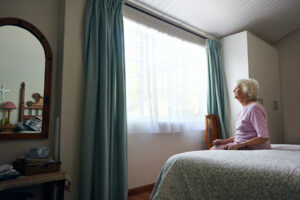Seniors are at risk of depression for many reasons. The most common are: medications, chronic and acute health conditions, especially hearing loss, and social isolation. Of all those causes, the only one really under a family’s control is
social isolation.
Causes of Isolation

Homecare Marietta GA – Depression In Seniors Is On the Rise Because of Social Isolation
Beginning in early 2020, many seniors became more socially isolated because of COVID-19. Nursing homes and assisted living facilities, in particular, put residents in an effective lock down. It became difficult for residents even to see and talk with family members.
Many residents of these facilities even lost access to classes, such as art and exercise classes, and social opportunities with other residents. This social isolation in care facilities was devastating to seniors, especially those who had self admitted to avoid isolation. The risk of depression and death became much higher for seniors in these facilities.
It is no coincidence that forty-two percent of the COVID-19 fatalities in the United States have been in assisted living facilities. In Ohio, that number is seventy percent. In Minnesota, it is eighty-one percent.
And that trend is unlikely to slow down in the immediate future, unless substantial changes are made to the social lives of seniors in those facilities. Seniors living at home fare better, especially if they have frequent visits from family and homecare agents. However, these seniors are also at risk for depression and its concurrent health hazards due to social isolation.
How Is Depression Diagnosed?
In diagnosing depression, many physicians used something called the “Hamilton Depression Rating Scale.” The test asks questions about feelings of depression, sadness, sleep loss, weight loss, feelings of worthlessness, guilt, inability to focus, etc.
At least one version of this tool is in the public domain. Families and friends are welcome to peruse the test and ask their loved one these questions. However, the tool can only be used to diagnose depression by a qualified doctor.
Treatment
Recent research shows that antidepressants work differently in people over 60 than they do in younger people. The overall health and fitness of the senior makes a difference. In one study, seniors who were fit and healthy improved with antidepressants. But in their peers who were “frail,” the meds didn’t take.
“Frailty” is a term that medical professionals use to indicate poor medical health and poor strength. The most common traits of frailty are bone loss, muscle loss, being underweight, low physical activity, and poor strength.
Among the tests for frailty is grip strength. One study found a strong correlation between poor grip strength and the body’s inability to process antidepressants effectively to defeat depression.
So, it follows that the treatment for depression in the frail is going to overlap with the treatment for the frailty. Exercises that build up stamina and strength have been shown to improve mood as well as muscle tone. A healthy diet, rich in protein, may improve weight and appetite. Professional homecare can ensure that a senior is walking outside and eating regular meals.
In conclusion, social isolation and depression in seniors go hand in hand. That is part of what caused so many deaths in nursing homes in 2020. In depressed seniors who have lost a lot of strength, the recommended course of treatment may be non-pharmacological. More social engagement and more exercise have been linked to improved mental health as well as to longevity.
Sources: https://www.cdc.gov/aging/publications/features/lonely-older-adults.html
https://www.forbes.com/sites/theapothecary/2020/05/26/nursing-homes-assisted-living-facilities-0-6-of-the-u-s-population-43-of-u-s-covid-19-deaths/
https://www.theatlantic.com/ideas/archive/2021/01/social-depression-america-failed-its-elderly/617496/
https://dcf.psychiatry.ufl.edu/files/2011/05/HAMILTON-DEPRESSION.pdf
If you or an aging loved-one is considering Homecare Services in Marietta GA please contact the caring staff at CaraVita Home Care today. (770) 643-1712

